Key takeaways:
- Gender equality advocacy is a societal issue that requires the involvement and voices of all genders, promoting healthier communities.
- Finding and sharing one’s voice can inspire others to participate, creating a collective momentum for change and addressing gender biases.
- Active listening fosters deeper connections and empathy, enhancing the effectiveness of advocacy and collaboration among individuals.
- Encouraging and supporting others in advocacy builds a strong community, highlighting the power of solidarity and shared success in promoting gender equality.
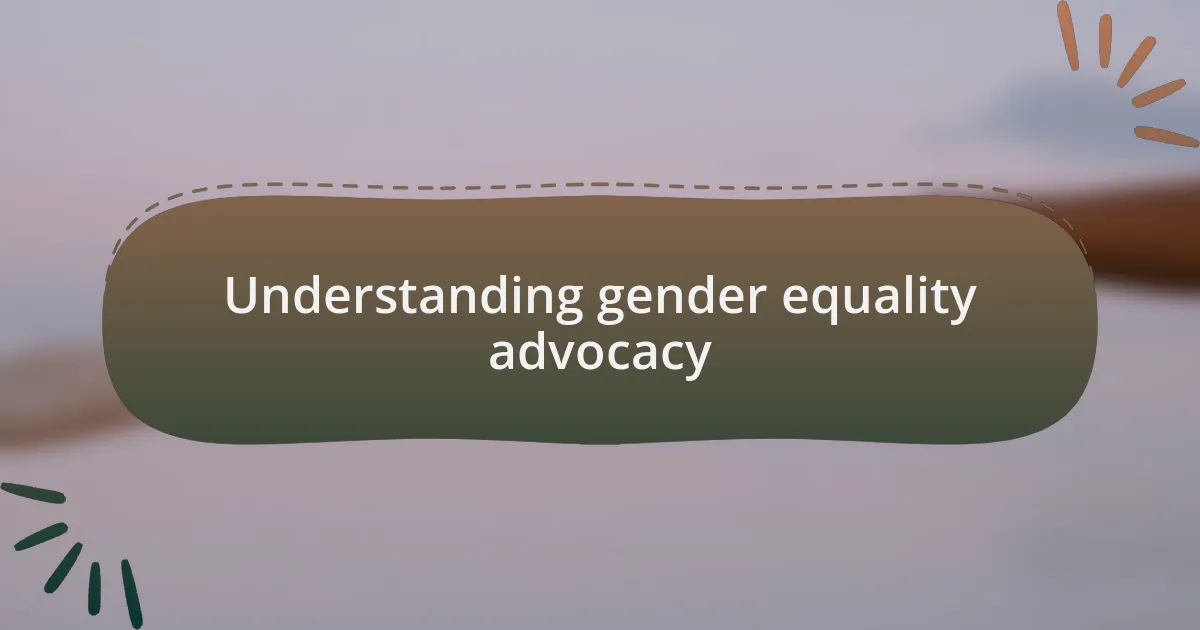
Understanding gender equality advocacy
Gender equality advocacy is fundamentally about leveling the playing field for all genders, ensuring that everyone has the same opportunities, rights, and responsibilities. I remember an early experience at a community meeting where I felt the weight of my words. I shared my thoughts on unequal pay, and it struck me how personal stories can be powerful tools for change. Have you ever thought about how your voice could influence someone’s perspective?
A crucial aspect of gender equality advocacy is understanding that it’s not just a women’s issue; it’s a societal issue that affects everyone. I once attended a panel where a male speaker discussed the impact of gender norms on his actions and relationships. It was eye-opening to hear him articulate his struggle with societal expectations, which made me realize that when we advocate for gender equality, we’re promoting a healthier society for all. Isn’t it fascinating how these dialogues can shift our understanding?
Through advocacy, we aim to dismantle the structures that perpetuate inequality. I recall the time I organized a workshop focusing on men’s roles in supporting gender equality; the enthusiasm and engagement from participants were invigorating. It became clear to me that advocacy isn’t just about presenting issues; it’s about creating spaces where everyone feels empowered to contribute. How can we collectively foster these supportive environments in our communities?
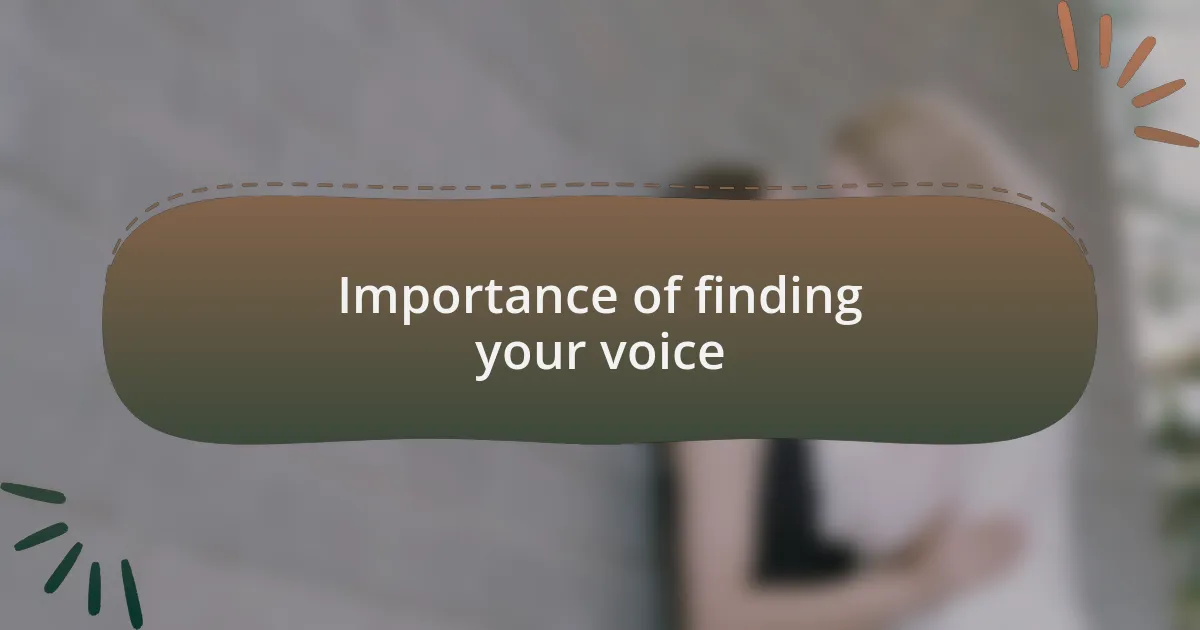
Importance of finding your voice
Finding your voice in discussions is crucial, especially in the realm of gender equality advocacy. I recall a heated debate I participated in during a local forum. As I finally expressed my thoughts on the importance of listening to marginalized voices, I noticed a shift—others started to share their own experiences. It was a reminder that when one person speaks up, it encourages others to find their voice too.
When I think about the importance of finding one’s voice, I realize it fuels confidence and authenticity. I once hesitated to express my opinions in a meeting, fearing backlash. Yet, when I finally did, not only did I feel a weight lift off my shoulders, but I also inspired a colleague to share her own thoughts on the subject. That moment reinforced what I believe: everyone deserves to be heard.
Moreover, our voices carry the potential to ignite change. I still remember how one passionate speech I gave about equal treatment in workplaces sparked a series of discussions among my peers. The energy in that room was palpable, and it made me see how our collective voices can challenge norms and drive progress. Have you considered the impact of your voice in advocacy?
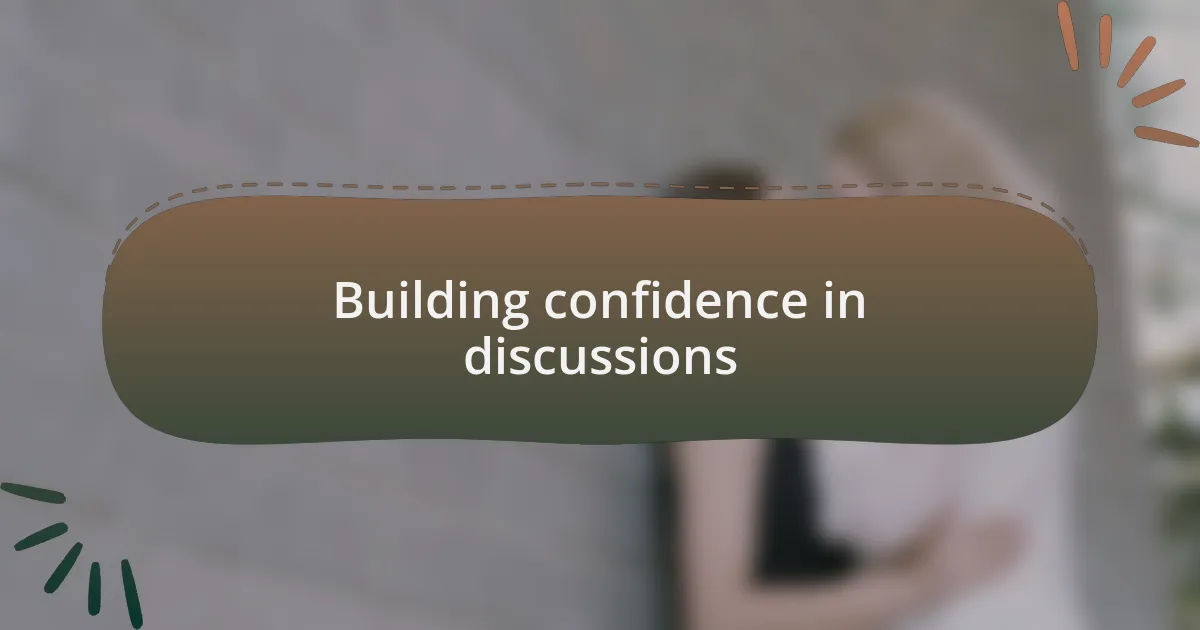
Building confidence in discussions
Building confidence in discussions often starts with acknowledging our own worth and the value of our perspectives. I remember a time when I felt utterly unprepared for a panel discussion. My palms were sweaty, and I was afraid my voice would shake. But once I reminded myself of the research and passion driving my views, I found a newfound sense of assurance that made me feel like I belonged.
Preparation can be a game changer for confidence. Before a recent workshop, I took time to outline my main points and practice how to communicate them effectively. When it came time to speak, I felt empowered rather than anxious. Isn’t it amazing how a little preparation can transform your experience in discussions? Knowing you’re prepared allows you to engage more freely without the fear of stumbling over your words.
Additionally, the support of allies can significantly boost our confidence during conversations. In a group dialogue aimed at addressing gender biases, I found strength in my peers who encouraged open sharing. Their nods of agreement and affirmations made me feel amplified rather than alone. Have you ever noticed how a supportive atmosphere can elevate your confidence and encourage your voice to be heard? It’s a reminder that we’re not just individuals; we’re part of a community that thrives on shared experiences.
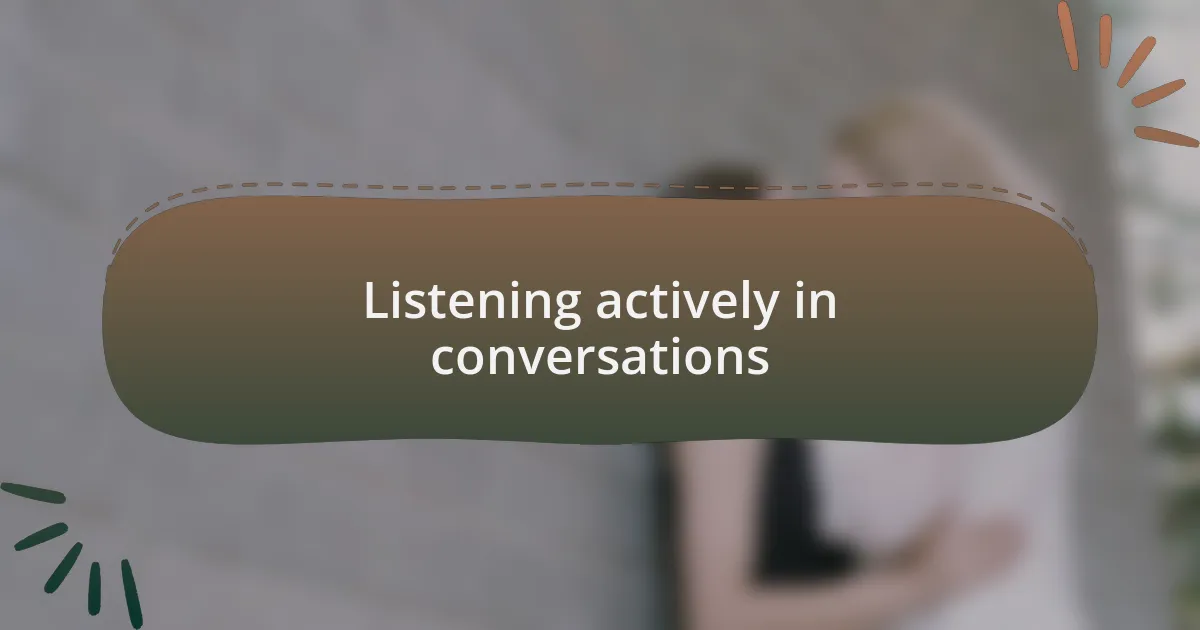
Listening actively in conversations
Listening actively is often the cornerstone of meaningful conversations. I vividly recall a particular discussion on gender equality where I initially struggled to convey my points. However, as I made a conscious effort to truly listen to others, I discovered that every voice carried unique insights which enriched my understanding. Doesn’t it often feel like we learn more from others than we do from our own perspectives?
Engaging with others through active listening cultivates a deeper connection. During a recent conversation, I found that by focusing solely on the speaker’s words, I not only honored their perspective but also recognized common ground where we could align our ideas. This approach transformed the dialogue into a collaborative exchange rather than a series of isolated opinions. How often do we think about the power of simply listening and how it can open up avenues for more impactful discussions?
The emotional layer of active listening can’t be understated. I remember a time when a fellow advocate shared their experience of discrimination, and my attentive listening allowed them to express their feelings without interruption. The vulnerability they showed helped me connect on a personal level and reinforced the importance of empathy in our advocacy work. Isn’t it fascinating how a single moment of presence can create a lasting impact on our shared goals?
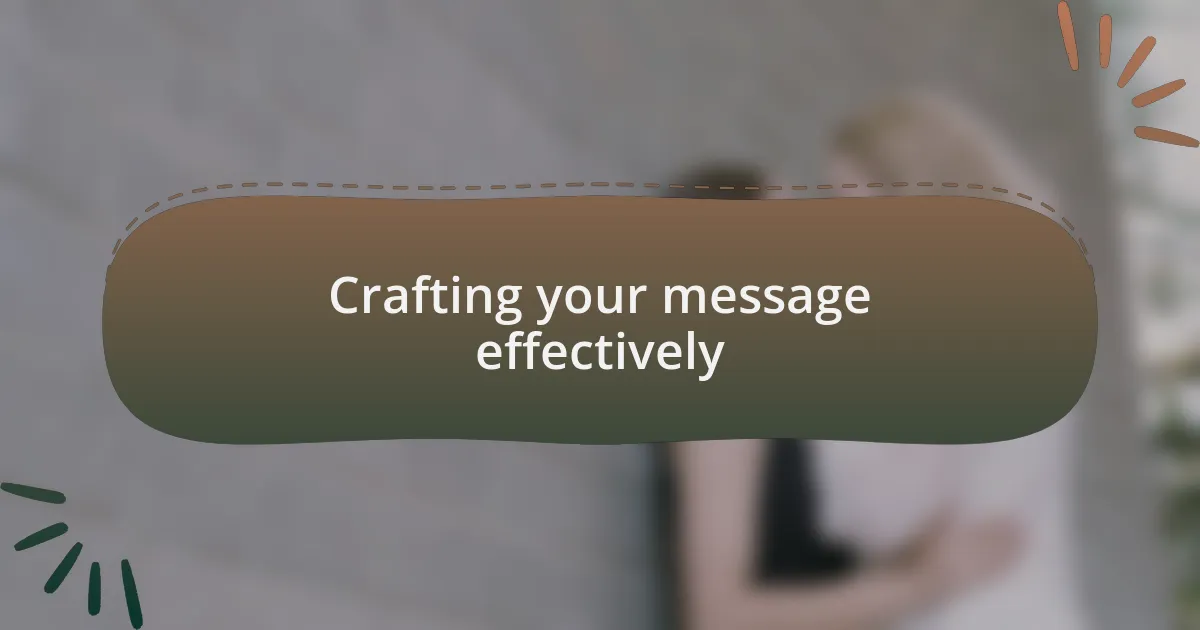
Crafting your message effectively
Crafting your message effectively requires clarity and intention. I remember preparing for a community forum where I wanted to discuss the subtle dynamics of privilege within gender dialogues. I started by mapping out my main points on a notepad, focusing on conveying them in a way that resonated with the audience. Have you ever felt that surge of confidence when you finally articulate what you truly believe? It’s a powerful feeling.
Using relatable examples can also significantly strengthen your message. During a workshop, I shared a personal story about a time I witnessed gender bias in the workplace. It not only captured attention but also invited others to share their experiences, creating a dialogue rich with mutual understanding. Doesn’t it make a difference when we can connect our arguments to real-life situations?
Lastly, the tone of your message is crucial. When discussing sensitive topics like gender equality, I strive to balance assertiveness with compassion. I vividly recall addressing a mixed audience about the importance of allyship. By choosing my words carefully and adapting my delivery based on their reactions, I felt the room shift from resistance to openness. Isn’t it remarkable how a slight change in tone can bridge divides?
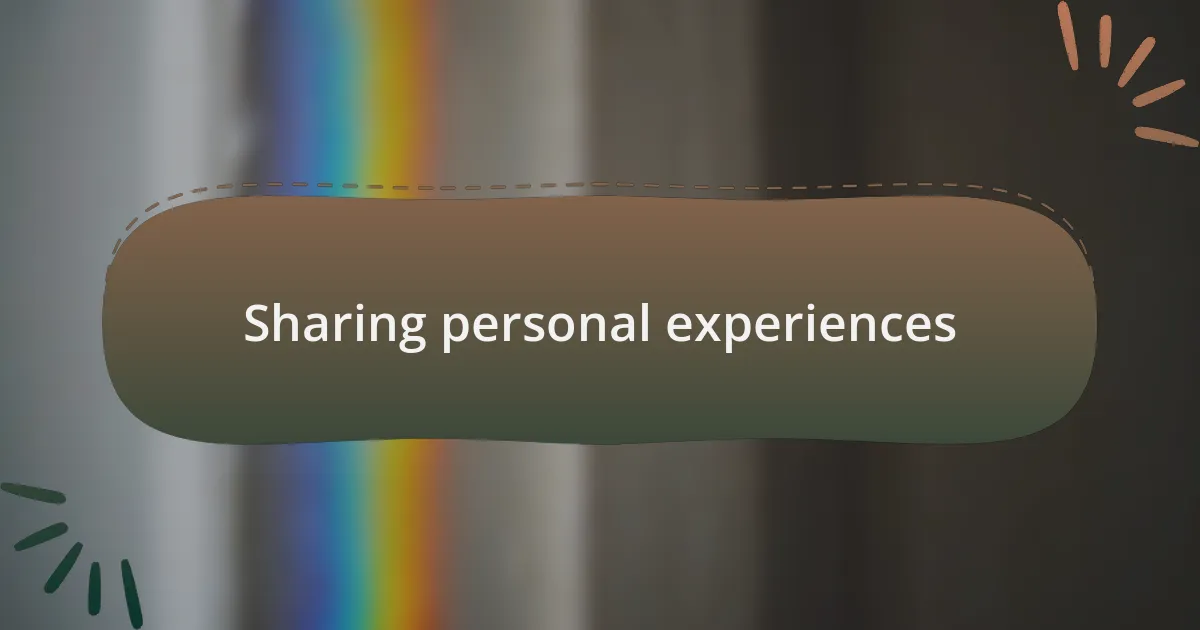
Sharing personal experiences
Sharing personal experiences can be a transformative way to connect with others on issues of gender equality. I vividly remember a moment during a group discussion when I revealed my struggle with being taken seriously in male-dominated spaces. The vulnerability of that admission was scary, yet it sparked immediate empathy. Have you ever felt that moment when sharing your truth allowed others to find their own voices?
There’s something inherently powerful about storytelling. One time, I recounted an incident from my college days when I challenged a professor’s stereotypical remark. The room was filled with tension as I recalled my feelings of anger and determination. I could see others leaning in, their own stories starting to surface. How amazing is it that sharing one experience can create a ripple effect, encouraging others to reflect on their journeys?
When I think about the impact of sharing personal stories, I often find myself reminded of the connections formed through shared struggles. At a recent panel discussion, I opened up about the challenges I faced when advocating for equal pay and how those experiences shaped my perspective. It was incredible to witness a shift in the audience—a palpable energy of engagement and shared resolve. Isn’t it fascinating how legitimizing our own worries can create a community of support?
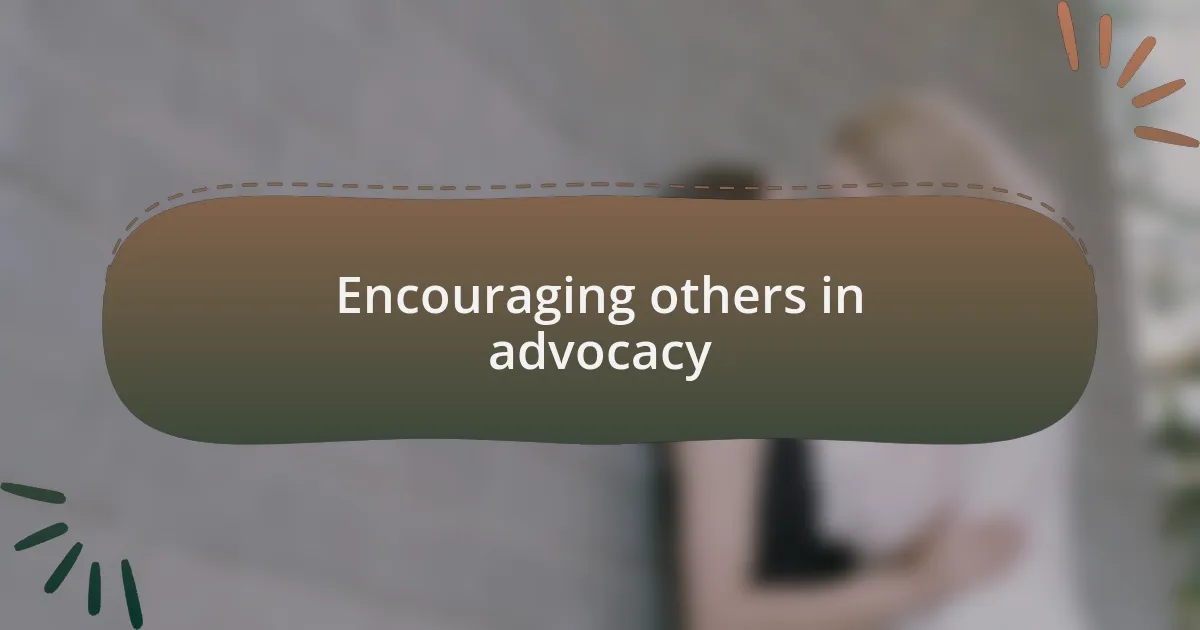
Encouraging others in advocacy
There’s something remarkable about lifting others up in advocacy. I recall a time when a fellow activist shared her hesitation in speaking out about harassment. With each word she spoke, I felt a deep sense of responsibility. Encouraging her to express herself not only empowered her but also reminded me of the importance of solidarity. Have you ever supported someone through their fears, only to see them blossom into a confident advocate?
When I began mentoring young activists, I was amazed by their fresh perspectives. One of them once said that my encouragement made her feel like she had a seat at the table. Hearing this made me realize that sometimes, all it takes is a little nudge to ignite someone else’s passion. How powerful is it that our voices can resonate and embolden those around us?
I have found that celebrating small victories together can foster a sense of community. I remember when a friend successfully led a local campaign on gender awareness. I could see the joy and pride radiate from her as we celebrated the achievement. This moment was a beautiful reminder that when we uplift each other, we change the dynamics of advocacy, transforming it into a shared journey filled with hope and courage. Isn’t it inspiring to think that encouragement can build a collective strength?